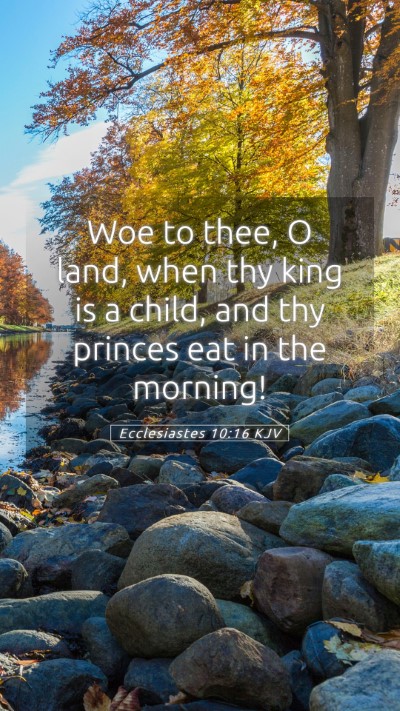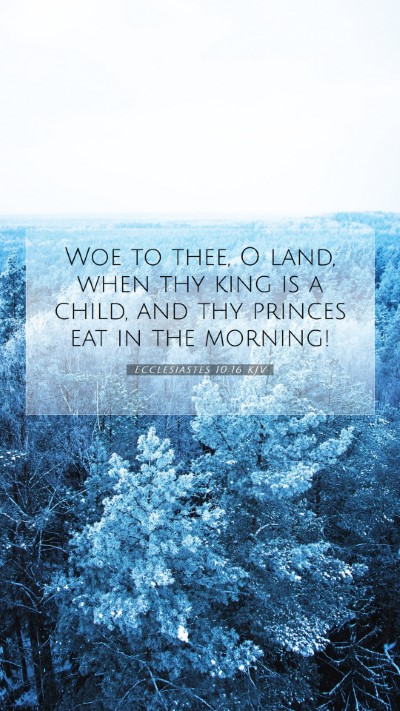Understanding Ecclesiastes 10:16
Ecclesiastes 10:16 states: "Woe to thee, O land, when thy king is a child, and thy princes eat in the morning!" This verse presents a grave warning regarding the state of leadership and governance. Through the interpretations of respected public domain commentaries, we glean important insights into its meaning.
Contextual Overview
The book of Ecclesiastes, traditionally attributed to Solomon, reflects on the meaning of life and the human experience. It presents wisdom that is often paradoxical, emphasizing the importance of wisdom and prudence in contrast to folly and childishness. The contrast established in this particular verse highlights the implications of governance under immature leadership.
Verse Meaning and Interpretation
According to Matthew Henry's Commentary, this verse signifies the misfortune that befell a kingdom when it is ruled by immaturity—implying a lack of wisdom and competence. Here, a "child" represents not only physical age but also a metaphoric immaturity, suggesting a severe deficiency in experience and discernment necessary for leadership.
Albert Barnes' Notes elaborate further, indicating that the phrase "princes eat in the morning" suggests indulgence and a lack of responsibility among leaders. Eating in the morning can symbolize a carefree attitude, one that prioritizes pleasure and luxury over prudent governance. It reflects a state of affairs where leaders are more focused on their immediate desires rather than the well-being of their people.
Meanwhile, Adam Clarke's Commentary brings attention to the broader implications of wise versus foolish rule. He emphasizes that a wise ruler fosters peace and prosperity, while a childish king brings chaos and distress to the land, resulting in a woe that resonates throughout society. This interpretation prompts careful reflection on the qualities desirable in leaders and the impact of their character on the community's welfare.
Key Insights from Commentaries
- Leadership Qualities: The verse stresses the necessity of wisdom and maturity in leadership roles.
- Consequences of Folly: It warns of the repercussions when leaders lack these essential qualities.
- Societal Impact: The health of a nation or community is directly related to the quality of its leaders.
Application of Ecclesiastes 10:16
When applying the verse to modern life, it’s critical to scrutinize present-day leaders through the lens of wisdom and maturity. This can be especially pertinent during times of political change or societal unrest. It teaches us to seek leaders who embody responsibility and foresight, qualities that truly ensure the prosperity and safety of the community.
Bible Study Insights
This verse serves as a focal point for various bible study topics. For those engaged in bible study groups or online Bible study, discussions surrounding governance, leadership qualities, and societal responsibilities can lead to profound insights into how scripture applies to contemporary issues. It also provides a framework for studying other verses that deal with leadership and wisdom.
Cross-References
- Proverbs 28:2 - Discusses the effects of wicked leadership on a nation.
- 1 Samuel 8:10-18 - A warning about the consequences of poor leadership.
- Isaiah 3:4 - God will give children as rulers, leading to confusion.
Conclusion
In conclusion, Ecclesiastes 10:16 is a potent reminder of the importance of maturity and wisdom in leadership. The insights from respected commentaries reveal profound implications for both historical and contemporary contexts. As individuals seeking to deepen our understanding of scripture, we must consider whom we choose to follow and the characteristics we value in our leaders.


